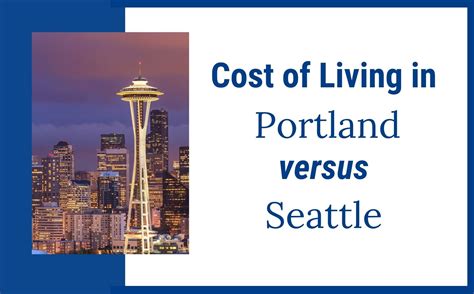The Pacific Northwest cities of Seattle and Portland are often compared for their vibrant culture, natural beauty, and economic opportunities. However, when it comes to the cost of living, the two cities have significant differences. This article will delve into a comprehensive comparison of the cost of living in Seattle and Portland, examining key factors such as housing, transportation, food, healthcare, and taxes.

Housing: A Significant Disparity
Housing costs are a major determinant of the overall cost of living in a city. In Seattle, the median home price is approximately $875,000, while in Portland, it is about $550,000, according to Zillow. This disparity is reflected in rental prices as well, with the median rent in Seattle being $2,100 per month compared to $1,400 per month in Portland.
Transportation: A Mix of Options
Transportation costs can vary depending on the mode of transport and the distance traveled. In Seattle, public transportation is more extensive and efficient than in Portland. The city’s Sound Transit system includes light rail, commuter rail, and buses, while Portland has a more limited MAX light rail system and a less comprehensive bus network.
Car ownership and maintenance costs are comparable in both cities. According to AAA, the average cost of gasoline is slightly lower in Portland than in Seattle, while insurance rates are generally similar.
Food: Northwest Delicacies
The cost of food is influenced by factors such as the availability of local produce and the presence of specialty grocery stores. In Seattle, the Pike Place Market offers a wide variety of fresh and gourmet foods, but overall, grocery prices are higher than in Portland. The Portland Farmers Market is also renowned, and the city has a strong farm-to-table culture, which helps keep food costs more affordable.
Healthcare: Quality and Accessibility
Healthcare costs are essential to consider when assessing the cost of living. In Seattle, the University of Washington Medical Center is a top-rated hospital, while in Portland, Oregon Health & Science University Hospital is highly respected. Both cities offer a range of healthcare providers and insurance options.
According to a report by the Kaiser Family Foundation, the average annual health insurance premium for a family of four is slightly higher in Seattle than in Portland. However, Seattle offers more providers that accept Medicare and Medicaid.
Taxes: Different Approaches
Taxes are a significant expense that can impact the overall cost of living. Seattle and Portland have different tax structures. Seattle has a 10.1% sales tax, one of the highest rates in the country. Portland, on the other hand, has a 9% sales tax. Both cities have a property tax, but Seattle’s rates are typically higher.
Cost of Living Index: A Numerical Comparison
The Council for Community and Economic Research (C2ER) publishes a cost of living index that measures the cost of goods and services in different cities relative to the national average. According to the C2ER, Seattle has a cost of living index of 136.5, while Portland’s is 121.5. This means that Seattle is approximately 36.5% more expensive than the national average, while Portland is 21.5% more expensive.
Cost of Living Comparison Tables
To provide a more detailed comparison of the cost of living in Seattle and Portland, the following tables summarize key expenses:
| Category | Seattle | Portland |
|---|---|---|
| Median Home Price | $875,000 | $550,000 |
| Median Rent | $2,100/month | $1,400/month |
| Public Transportation (monthly pass) | $99 | $80 |
| Gasoline (gallon) | $4.50 | $4.20 |
| Groceries (weekly) | $200 | $170 |
| Healthcare Premium (family of four) | $2,500/month | $2,200/month |
| Sales Tax | 10.1% | 9% |
Factors to Consider When Choosing a City
When deciding between Seattle and Portland based on the cost of living, it is crucial to consider individual circumstances and priorities. Factors such as career opportunities, lifestyle preferences, and family size can all influence the cost of living.
Conclusion: A Tale of Two Cities
Seattle and Portland offer distinct living experiences with different costs of living. While Seattle has a higher price tag, it also offers a vibrant tech industry, stunning scenery, and a thriving cultural scene. Portland is more affordable, with a strong food culture, a thriving arts scene, and proximity to nature. Ultimately, the best choice depends on what matters most to each individual.
